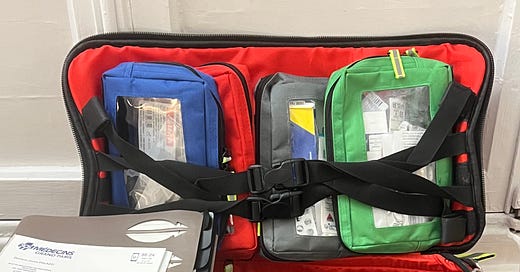Tits Out, Fever High: Calling SOS Medecins in Paris
The emergency house call service every Parisian should know about
I recently had the pleasure (cough: necessity) of using SOS Médecins in Paris, a 24/7 home-visit doctor service. You read that correctly: you call a hotline, answer a few questions, and they send a doctor directly to your apartment (or hotel, or Airbnb). You don’t have to move a muscle, which was ideal, because a few weeks ago I had a fever so high I could barely sit upright.
Historically, you had to pay in cash, but on this most recent visit, I was able to pay by credit card which felt like a minor miracle, given I wasn’t exactly eager to traipse to an ATM at midnight.
The call itself was straightforward. That said, even after all this time in France, when I’m sick, the language slips and I suddenly forget how buildings work. I panicked when I realized we hadn’t given them the name on the buzzer. Be prepared: you’ll need to provide a brief description of your symptoms and very clear instructions on how to enter your building: digicodes, floor, buzzer name, everything. If you're staying in a hotel, I highly recommend having the concierge handle it for you.
The doctor arrived around midnight, about two and a half hours after I called. I never had to leave my bed, which, frankly, felt impossible anyway. He listened attentively, checked my blood pressure, oxygen saturation, temperature, heart rate... the works. When I showed him my blue fingernails, he calmly pulled out an EKG machine from his bag. I kid you not.
Because there are no hospital gowns in this scenario, I had to take off my sweatshirt and was just... tits out on the bed with sensors stuck all over me. It’s worth noting that the bedside manner and sense of privacy you might expect in the American healthcare system can differ quite a bit here. Doctors may be trying to keep call times short, and the trade-off for this level of convenience is no coddling.
As journalist Katie McGrath put it:
“They need to understand that things work differently. I didn’t get so much as a text message confirming the appointment. You kind of just hope they’re going to show up? The doctor used his iPhone camera to look inside my mouth.”
That said? I’ll gladly take a topless EKG at home over the fluorescent horrors of the ER any day. I am grateful that this service exists at all. It feels impossible to imagine in America.
The doctor tested me for COVID, flu, and strep, all negative. Twenty minutes later, he diagnosed a mystery virus, prescribed Doliprane, and vanished into the night.
It was efficient, oddly intimate, and, shockingly, only cost me 35 euros out of pocket. Normally, it’s €70–90, reimbursable if you’re in the French system, but honestly worth it even if you’re not. I’ve had visiting friends use the service too, including one who came down with a stomach virus and easily requested an English-speaking doctor (though the wait was slightly longer).
Another local, Naomi Hasegawa, used the service just a couple of months after arriving in Paris, when her French was “pretty much non-existent.” She had food poisoning and was “desperately in need of antibiotics.”
“The doctor arrived within an hour, diagnosed the issue, gave me a prescription, and I recovered quickly,” she recalls. “It was a really positive experience: affordable, easy, and so convenient—especially when you’re running to the bathroom all the time.”
Journalist Caitlin Gunther says she actually prefers calling SOS Médecins in a pinch over scheduling with her daughter’s pediatrician.
“If my daughter has a fever or I can tell she’s coming down with bronchitis, I just go on Doctolib to make an appointment, and they come right away,” she says. “I pay around €60, get reimbursed by social security, and they give me whatever prescription I need. It feels very old-world. The doctor arrives with a satchel and medical equipment. It’s incredibly useful, and I love it.”
Of course, this service isn’t ideal for more complex or ongoing issues. As McGrath points out:
“While it’s a bandage for simple matters that are straightforward, if it’s a complex issue, the best move is to see a doctor in cabinet or via video. If the ailment isn’t that extreme, people should just download Doctolib or go to a pharmacy. Pharmacists here are much more diligent and trained than in the U.S., and can prescribe certain medications themselves.”
As for me? My “mystery virus” turned out to be hand, foot, and mouth disease, which became abundantly clear two days later when my hands and feet erupted in sores. C’est la vie.
Anyway, I’m fine now. But if you ever find yourself horizontal and helpless in Paris, save this number: 3624.
How to Use SOS Médecins in Paris
Number to call: 3624 (from any French phone) or +33 1 47 07 77 77 from a foreign number
Available: 24/7, including weekends and holidays
What you'll need:
The department number you're calling from (75 for Paris—you’ll enter this when dialing)
A brief description of symptoms
Full address + building codes, floor, buzzer name
Carte Vitale and mutuelle, if you have them
Payment (credit card usually accepted, but have cash just in case)
Cost: Typically €70–150 (often partially or fully reimbursed with French healthcare)
Languages: French is standard, but English-speaking doctors can often be requested
You don’t even need to get out of bed.




We just did this for my sister who had a very severe infection. They were even able to order tests and when they got results, they came back and adjusted her medicine. I was able to request the visit online. So incredibly easy and helpful